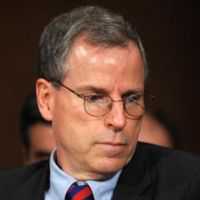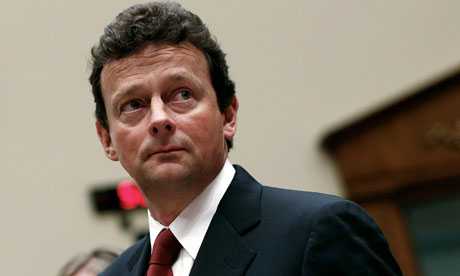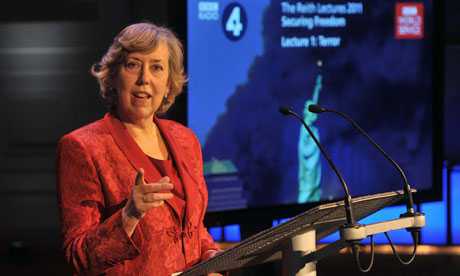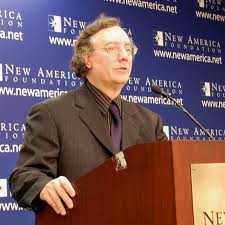AMY GOODMAN: Today marks the official launch of one of most anticipated memoirs of any top Bush administration official. I’m talking about former Vice President Dick Cheney’s 576-page memoir, In My Time: A Personal and Political Memoir. Cheney has begun a publicity blitz to promote his new book, with a string of TV appearances scheduled on Fox News Channel, as well as C-SPAN and the major networks. He appeared on The Today Show this morning. This is an excerpt of his pre-taped interview with Jamie Gangel that aired last night on NBCNews Dateline.
JAMIE GANGEL: In your view, we should still be using enhanced interrogation?
DICK CHENEY: Yes.
JAMIE GANGEL: Should we still be waterboarding terror suspects?
DICK CHENEY: I would strongly support using it again if we had a high-value detainee and that was the only way we can get him to talk.
JAMIE GANGEL: People call it torture. You think it should still be a tool?
DICK CHENEY: Yes.
JAMIE GANGEL: Secret prisons?
DICK CHENEY: Yes.
JAMIE GANGEL: Wiretapping?
DICK CHENEY: Well, with the right approval.
JAMIE GANGEL: You say it is one of the things you are proudest of, and you would do it again in a heartbeat.
DICK CHENEY: It was controversial at the time. It was the right thing to do.
JAMIE GANGEL: No apologies?
DICK CHENEY: No apologies.
AMY GOODMAN: That was Dick Cheney speaking to Jamie Gangel onNBC Dateline. Cheney says his memoir is loaded with revelations. He told Gangel, quote, “There are going to be heads exploding all over Washington.”
In addition to unequivocally defending what he calls “tough interrogations” on captured terrorism suspects, Cheney writes he argued against softening the president’s speeches on Iraq. He says he sees no need for the administration to apologize for erroneously claiming Iraq hunted for uranium in Niger. Cheney also reveals he tried to have former Secretary of State Colin Powell removed from the cabinet for expressing doubts about the Iraq war. And Cheney notes he unsuccessfully urged President George W. Bush to bomb Syria in June 2007.
One of those to come under the most scrutiny in the book is Bush’s former Secretary of State, Colin Powell. This is an excerpt of Cheney’s interview with Jamie Gangel, again from Dateline.
JAMIE GANGEL: The portrait you paint of Colin Powell makes it sound as if he was disloyal and undermining the administration.
DICK CHENEY: Well, those are your words. I don’t think I say it as harshly as you have presented it. I did feel that the State Department did not serve the president well. I would hear discussions, for example, that General Powell had objected to or opposed our operations in Iraq. But that never happened sitting around the table in the National Security Council. It was the kind of thing that seemed to be said outside to others.
AMY GOODMAN: To discuss former Vice President Dick Cheney’s version of history as outlined in his book In My Time, we’re joined from Washington, D.C., by Colonel Lawrence Wilkerson, served as chief of staff to Secretary of State Colin Powell from 2002 to 2005.
Welcome to Democracy Now!, Lieutenant Wilkerson. Can you respond to what Cheney just said on NBC, Colonel Wilkerson?
COL. LAWRENCE WILKERSON: Amy, listening to your recitation—yeah, listening to your recitation of events at the head of the show and then your in-depth interview with the gentleman from Vermont, particularly the deaths in Afghanistan of American and allied troops and the devastation of Hurricane Irene, I think I could characterize Cheney’s book as singularly insignificant. That said, I think his use of phrases like those that were quoted — “exploding heads all over Washington” — as my former boss and former Secretary of State Colin Powell said on Face the Nation on Sunday, is more of a grocery store tabloid, and certainly not the kind of language that a former vice president of the United States of America should be using. Again, like Brent Scowcroft, I think in 2003 or 2004 in an interview with The New Yorker magazine, I simply don’t recognize Dick Cheney anymore.
AMY GOODMAN: Talk about what he had to say about your boss, about General Colin Powell and his views on the Iraq war.
COL. LAWRENCE WILKERSON: The most inciteful thing—with a C, not an S—that the Vice President apparently has put in his book, due to excerpts I’ve seen and so forth—I have not read the book, I have to say that; I do not have a copy of it, not sure I’m going to buy a copy of it—was that he had something to do with Colin Powell leaving in January 2005. That’s utter nonsense. Colin Powell had told the president of the United States, the president-elect of the United States, that he’d be a one-term secretary. He had told all of us that, “us” being his inner team and also the team that he used most confidentially and most often within the State Department. In fact, when he asked me to be his secretary—to be his chief of staff in August of 2002, he was very kind to me. He said, “Look, you can stay on beyond the turn of the year and so forth when I leave, because you’ll be working for Ambassador Haass, which I know you enjoy, in policy planning, and you could stay on for eight years, if the president is reelected, or as long as you wish. But if you come to work for me as my chief of staff, you will have to leave. You will have to leave very soon, and no later than December-January, ’04-’05.” So this contention by Cheney is utterly preposterous.
AMY GOODMAN: In his memoir, Cheney accuses Colin Powell of trying to undermine President Bush during the run-up to the Iraq war and tacitly allowing his deputy to leak the name of a covert CIA agent. Speaking on CBS’s Face the Nation on Sunday, Powell defended his approach to the Iraq war.
COLIN POWELL: Mr. Cheney may forget that I’m the one who said to President Bush, if you break it, you own it. And you have got to understand that if we have to go to war in Iraq, we have to be prepared for the whole war, not just the first phase. And Mr. Cheney and many of his colleagues did not prepare for what happened after the fall of Baghdad.
AMY GOODMAN: And let me turn to, again, Vice President Cheney’s interview on NBC News Dateline with Jamie Gangel last night. In this clip, Gangel talks to Cheney about discovering there were no WMDs in Iraq.
JAMIE GANGEL: In his book, President Bush wrote he had, quote, “sickening feeling.” But you don’t seem to express the same reaction or regrets.
DICK CHENEY: Well, I didn’t have a sickening feeling. I think we did the right thing.
AMY GOODMAN: Your response, Colonel Wilkerson?
COL. LAWRENCE WILKERSON: I, unfortunately—and I’ve admitted to this a number of times, publicly and privately—was the person who put together Colin Powell’s presentation at the United Nations Security Council on 5 February, 2003. It was probably the biggest mistake of my life. I regret it to this day. I regret not having resigned over it. So I fully support his contention that he was hardly undermining the positions of the president of the United States, particularly with regard to Iraq. He put his reputation on the line. And he has said publicly that he will be always remembered as the man who gave that presentation at the U.N. in 2003. So, again, the Vice President’s contentions are preposterous.
Furthermore, the Vice President seems to find fault with Condi, Condi Rice, the secretary after Powell, with Powell, with Armitage, with the President himself. The only person Cheney does not seem to find fault with is Cheney. I think we have a word for that kind of person. I won’t use it here on television. But I think Mr. Cheney’s view is totally, utterly, completely Mr. Cheney’s view. I doubt there are very many people in America, other than the cheerleading squad for people like Cheney, who love torture and the like, who will even read his book. Or if they do read it, they’ll read it in order to increase their revulsion of him, rather than their respect for him. And that’s a pity, because he is a former vice president.
AMY GOODMAN: Let me ask you, Colonel Wilkerson, talking about your having written that speech for Colin Powell, how you put it together. And at that time, because there was so much skepticism, did you have doubts about what you were writing?
COL. LAWRENCE WILKERSON: Absolutely, Amy. My whole team had doubts. In fact, we asked the question early on, why wasn’t this our ambassador at the United Nations, John Negroponte, as Adlai Stevenson had done for Kennedy during a far more serious crisis in October 1962, the so-called Cuban Missile Crisis? And we all laughed and answered our own question immediately. It was because no one in the Bush administration had high poll ratings, amongst the American people or the international community. Colin Powell’s ratings were up there with Mother Teresa at the time, in the low seventies, sometimes even going up into the high seventies, low eighties. So this is the reason they put him in New York.
And I didn’t write the speech. That belongs to his speechwriters. I actually orchestrated the entire team—the White House team, the CIAteam and so forth—out at Langley at CIA headquarters. And the way we did that was under the leadership and under the respect for and really the umbrella of George Tenet, the director of Central Intelligence/head of the CIA. And George was constantly asked by me, by Colin Powell, by Rich Armitage, by Condoleezza Rice and others—she was national security adviser at the time—in front of everyone on that team, “You stand by this, George? You corroborate to the Secretary of State that you have multiple sources independently determining each one of these facts that we’re giving?” And we threw lots of the facts out. We threw literally a third of the presentation out. The unfortunate thing is that we left in what George was most convincing on, and that was the mobile biological laboratories, the existing stocks of chemical weapons, and worst of all, an active nuclear program. And as I said, I will regret that to my grave.
AMY GOODMAN: How did the intelligence get so contaminated, manipulated? How was it so wrong?
COL. LAWRENCE WILKERSON: In my view, you have to look at each one of the so-called pillars of the presentation, the three that I just named being the most prominent. “Curveball,” we didn’t even know that term when George Tenet was presenting us the information about the mobile biological labs. Curveball, as we all know now, was an agent being run by the BND, the CIA’s equivalent in Germany. And the Germans, as well as the CIA station chief in Germany—or in Europe, actually, Tyler Drumheller, had expressed their dismay with and lack of reliability of Curveball. And yet, we went ahead and used that information. George Tenet or John McLaughlin, his deputy, never said a word about Curveball to us. They simply gave us four independently corroborable sources for the existence of the labs. They even gave us drawings, and so forth, of those labs, that had supposedly come from an Iraqi engineer who was injured in an accident that occurred in one of the labs that actually kill people, testifying to the lethality of the ingredients being used in the labs. So, we had all of this prima facie, circumstantial, if you will, evidence that George Tenet and his team presented to us, indeed representing the entire 16—at that time, 16-entity U.S. intelligence community.
The same on the chemical stocks, the same on the active nuclear program, aluminum tubes of which was a big aspect of. Colin Powell doubted them so much that John McLaughlin actually brought one of them in and rolled it around on the DCI’s conference table and explained to the Secretary of State how the metal in that tube was so expensive that it was impossible to believe that Saddam Hussein would be spending that much money on tubes that were simply for rocket shielding, which was the other explanation of what the tubes were for. So, the DCI and the deputy DCI spent a lot of time and effort trying to convince the Secretary of State not to throw things out of the presentation. Unfortunately, we left enough in that made us really sort of the laughing stock of the world afterward.
AMY GOODMAN: You said in 2009—I think this is what you’re getting to now—in the Washington Note, an online political journal, you talked about how finding a smoking gun linking Iraq and al-Qaeda became the main purpose for the abusive interrogation program that the Bush administration authorized in 2002.
COL. LAWRENCE WILKERSON: In summer of 2002, my FBIcolleagues, my CIA colleagues, who will speak the truth to me, have told me that. I’ve also gleaned it from other methods that I can’t talk about here on the television. Someday they will come to light, and historians will record them. But let me explain to you how Colin Powell dealt with that in his presentation, to return to that infamous moment again. We were throwing out—he had pulled me aside in the National Intelligence Council spaces in the CIA, put me in a room, he and I alone, and he told me he was going to throw all the presentation material about the connection between Baghdad and al-Qaeda out, completely out. I welcomed that, because I thought it was all bogus.
Within about an hour, George Tenet, having scented that something was wrong with the Secretary vis-à-vis this part of his presentation, suddenly unleashes on all in his conference room that they have just gotten the results of an interrogation of a high-level al-Qaeda operative, and those results not only confirm substantial contacts between an al-Qaeda and Baghdad, the Mukhabarat and Baghdad, the secret police, if you will, but also the fact that they were training, they were actually training al-Qaeda operatives in the use of chemical and biological weapons. Well, this was devastating. Here’s the DCItelling us that a high-level al-Qaeda operative had confirmed all of this. So Powell put at least part of that back into his presentation.
We later learned that that was through interrogation methods that used waterboarding, that no U.S. personnel were present at the time—it was done in Cairo, Egypt, and it was done by the Egyptians—and that later, within a week or two period, the high-level al-Qaeda operative recanted everything he had said. We further learned that the Defense Intelligence Agency had issued immediately a warning on that, saying that they didn’t trust the reliability of it due to the interrogation methods. We were never shown that DIA dissent, and we were never told about the circumstances under which the high-level al-Qaeda operative was interrogated. Tenet simply used it as a bombshell to convince the secretary not to throw that part, which was a very effective part, if you will recall, out of his presentation.
AMY GOODMAN: Colonel Wilkerson, we also have Glenn Greenwald on the line with us from Rio de Janeiro, Brazil. He is a constitutional law attorney, political and legal blogger for Salon.com. His recent article on Cheney’s book is called “The Fruits of Elite Immunity.” Glenn, explain.
GLENN GREENWALD: One of the most significant aspects of the rollout of Dick Cheney’s book is that he’s basically being treated as though he’s just an elder statesman who has some controversial, partisan political views. And yet, the evidence is overwhelming, including most of what Colonel Wilkerson just said and has been saying for quite some time, and lots of other people, as well, including, for example, General Antonio Taguba, that Dick Cheney is not just a political figure with controversial views, but is an actual criminal, that he was centrally involved in a whole variety not just of war crimes in Iraq, but of domestic crimes, as well, including the authorization of warrantless eavesdropping on American citizens in violation of FISA, which says that you go to jail for five years for each offense, as well as the authorization and implementation of a worldwide torture regime that, according to General Barry McCaffrey, resulted in the murder—his word—of dozens of detainees, far beyond just the three or four cases of waterboarding that media figures typically ask Cheney about.
And yet, what we have is a government, a successor administration, the Obama administration, that announced that there will be no criminal investigations, no, let alone, prosecutions of any Bush officials for any of these multiple crimes. And that has taken these actions outside of the criminal realm and turned them into just garden-variety political disputes. And it’s normalized the behavior. And as a result, Dick Cheney goes around the country profiting off of this, you know, sleazy, sensationalistic, self-serving book, basically profiting from his crimes, and at the same time normalizing the idea that these kind of policies, though maybe in the view of some wrongheaded, are perfectly legitimate political choices to make. And I think that’s the really damaging legacy from all of this.
AMY GOODMAN: Colonel Wilkerson, do you think the Bush administration officials should be held accountable in the way that Glenn Greenwald is talking about?
COL. LAWRENCE WILKERSON: I certainly do. And I’d be willing to testify, and I’d be willing to take any punishment I’m due. And I have to say, I agree with almost everything he just said. And I think that explains the aggressiveness, to a large extent, of the Cheney attack and of the words like “exploding heads all over Washington.” This is a book written out of fear, fear that one day someone will “Pinochet” Dick Cheney.
AMY GOODMAN: Well, I thank you very much for being with us, both, Colonel Lawrence Wilkerson served as chief of staff to Secretary of State Colin Powell from 2002 to 2005, and Glenn Greenwald, speaking to us on that crackly phone line from Rio de Janeiro, Brazil, constitutional law attorney and political and legal blogger forSalon.com. We’ll link to your article there.
This is Democracy Now! When we come back, there’s another Bush administration official on a book tour. He’s Donald Rumsfeld. And he got quite a surprise as he was traveling through Washington State. The widow of a soldier who committed suicide questioned Donald Rumsfeld. He had heard taken out. Stay with us.






